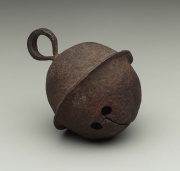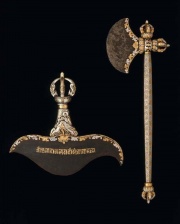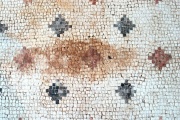Difference between revisions of "Iron"
m (Text replace - "\[http:\/\/cameo\.mfa\.org\/materials\/fullrecord\.asp\?name=([^\s]+)\s(.*)\]" to "$2") |
|||
| (4 intermediate revisions by the same user not shown) | |||
| Line 1: | Line 1: | ||
| − | [[File:17.2139-SC14279.jpg|thumb|]] | + | [[File:17.2139-SC14279.jpg|thumb|Horse Bell<br> MFA# 17.2139]] |
== Description == | == Description == | ||
| − | + | [[File:1987.256-E1847CR-d1.jpg|thumb|Ritual blacde<br>MFA# 1987.256]] | |
A hard, silvery-gray, malleable metallic element. Iron is the fourth most abundant element in the earth's crust comprising approximately 5%. It is rarely found as a native metal ([[telluric iron]]) except in meteorites ([[meteoric iron]]). Iron is most often found throughout the world as iron oxides ([[hematite]], [[magnetite]], [[limonite]], and [[siderite]]) mixed with other ores. Metallic iron is soft, ductile, malleable, and slightly magnetic. It holds magnetism after it has been hardened. Even though iron ores were abundant worldwide, the development of iron smelting was slow because of its complexity. The smelted iron required repeated heating, then hammering to produce a workable metal ([[wrought iron]]). Iron was used for tools, weapons and containers as early as 2800 BCE in Mesopotamia. By the 10th century BCE, iron began to replace bronze as the dominant metal, thus starting the iron age. [[Cast iron]], containing about 5% carbon, was first made in China about the 3rd century BCE. A non-corroded, wrought iron pillar made about 400 CE still stands in Delhi, India, even though iron is a strong reducing agent that readily oxidizes, or rusts, in air. Many types of coatings have been tried to prevent rust. Techniques for coating iron sheets with tin ([[tinplate]]) were developed in the 17th century, but not widely used until 20th century eletroplating techniques were developed. Iron sheets were first [[galvanized metal|galvanized]] with thin layers of zinc in the mid-18th century by Melouin. Procedures for refining iron into [[steel]] were established by the late 19th century. Finally, at the turn of the 20th century, a rustproof iron was developed when [[chromium] was alloyed with iron to produce [[stainless steel]]. | A hard, silvery-gray, malleable metallic element. Iron is the fourth most abundant element in the earth's crust comprising approximately 5%. It is rarely found as a native metal ([[telluric iron]]) except in meteorites ([[meteoric iron]]). Iron is most often found throughout the world as iron oxides ([[hematite]], [[magnetite]], [[limonite]], and [[siderite]]) mixed with other ores. Metallic iron is soft, ductile, malleable, and slightly magnetic. It holds magnetism after it has been hardened. Even though iron ores were abundant worldwide, the development of iron smelting was slow because of its complexity. The smelted iron required repeated heating, then hammering to produce a workable metal ([[wrought iron]]). Iron was used for tools, weapons and containers as early as 2800 BCE in Mesopotamia. By the 10th century BCE, iron began to replace bronze as the dominant metal, thus starting the iron age. [[Cast iron]], containing about 5% carbon, was first made in China about the 3rd century BCE. A non-corroded, wrought iron pillar made about 400 CE still stands in Delhi, India, even though iron is a strong reducing agent that readily oxidizes, or rusts, in air. Many types of coatings have been tried to prevent rust. Techniques for coating iron sheets with tin ([[tinplate]]) were developed in the 17th century, but not widely used until 20th century eletroplating techniques were developed. Iron sheets were first [[galvanized metal|galvanized]] with thin layers of zinc in the mid-18th century by Melouin. Procedures for refining iron into [[steel]] were established by the late 19th century. Finally, at the turn of the 20th century, a rustproof iron was developed when [[chromium] was alloyed with iron to produce [[stainless steel]]. | ||
| − | + | [[File:01-Iron stain C2.jpg|thumb|Iron stain]] | |
| − | [[File: | ||
| − | |||
== Synonyms and Related Terms == | == Synonyms and Related Terms == | ||
Fe; Ijzer (Ned.); fer (Fr.); Eisen (Deut.); ferro (It., Port.); hierro (Esp.); Järn (Sven.); meteoric iron; telluric iron; cast iron; stainless steel; metallic iron; elemental iron | Fe; Ijzer (Ned.); fer (Fr.); Eisen (Deut.); ferro (It., Port.); hierro (Esp.); Järn (Sven.); meteoric iron; telluric iron; cast iron; stainless steel; metallic iron; elemental iron | ||
| + | == Risks == | ||
| − | == | + | * Powdered iron can be a fire and explosion risk. |
| + | * Flash point (iron dust cloud)=430C | ||
| + | * ThermoFisher: [https://www.fishersci.com/shop/msdsproxy?productName=I57500&productDescription=IRON+METAL+FILINGS+FINE+500G&catNo=I57-500&vendorId=VN00033897&storeId=10652 SDS] | ||
| + | == Physical and Chemical Properties == | ||
Soluble in dilute mineral acids. Attacked by organic acids. | Soluble in dilute mineral acids. Attacked by organic acids. | ||
| Line 28: | Line 30: | ||
|- | |- | ||
! scope="row"| Melting Point | ! scope="row"| Melting Point | ||
| − | | 1535 | + | | 1535 C |
|- | |- | ||
! scope="row"| Density | ! scope="row"| Density | ||
| − | | 7.87 | + | | 7.87 g/ml |
|- | |- | ||
! scope="row"| Molecular Weight | ! scope="row"| Molecular Weight | ||
| Line 37: | Line 39: | ||
|- | |- | ||
! scope="row"| Boiling Point | ! scope="row"| Boiling Point | ||
| − | | 3000 | + | | 3000 C |
|} | |} | ||
| − | + | == Resources and Citations == | |
| − | == | ||
| − | |||
| − | |||
| − | + | * J. Ogden, "Metals" in ''Ancient Egyptian Materials and Technology'', P.Nicholson, I.Shaw (eds.), Cambridge University Press, 2000, p. 165-167. | |
| − | + | * O. Untracht, ''Metal Techniques for Craftsmen'', Doubleday and Co., Garden City, NY, 1968. | |
| − | + | * Web Elements: [http://www.webelements.com/webelements/elements/text/Fe/key.html Website] | |
| − | + | * CCI-ICC, 'How to Care for Iron Objects', Canadian Conservation Institute Publications, [http://www.cci-icc.gc.ca/publications/cidb/view-document_e.aspx?Document_ID=437 Conservation Information Database]. | |
| − | |||
| − | |||
| − | |||
| − | |||
| − | |||
| − | |||
* David C. Scott, ''Metallography and Microstructure of Ancient and Historic Metals'', The Getty Conservation Institute, Los Angeles, 1991 | * David C. Scott, ''Metallography and Microstructure of Ancient and Historic Metals'', The Getty Conservation Institute, Los Angeles, 1991 | ||
| Line 73: | Line 66: | ||
* A.Lucas, J.R.Harris, ''Ancient Egyptian Materials and Industries'', Edward Arnold Publishers Ltd., London, 4th edition, 1962 | * A.Lucas, J.R.Harris, ''Ancient Egyptian Materials and Industries'', Edward Arnold Publishers Ltd., London, 4th edition, 1962 | ||
| − | * ''Encyclopedia Britannica'', http://www.britannica.com Comment: iron" | + | * ''Encyclopedia Britannica'', http://www.britannica.com Comment: iron" [Accessed October 18, 2001 |
| − | * Wikipedia | + | * Wikipedia: http://en.wikipedia.org/wiki/Iron (Accessed Nov. 9, 2005) |
* Michael McCann, ''Artist Beware'', Watson-Guptill Publications, New York City, 1979 | * Michael McCann, ''Artist Beware'', Watson-Guptill Publications, New York City, 1979 | ||
| − | |||
| − | |||
* Tom Rowland, Noel Riley, ''A-Z Guide to Cleaning, Conserving and Repairing Antiques'', Constable and Co., Ltd., London, 1981 | * Tom Rowland, Noel Riley, ''A-Z Guide to Cleaning, Conserving and Repairing Antiques'', Constable and Co., Ltd., London, 1981 | ||
Latest revision as of 10:20, 21 September 2022
Description
A hard, silvery-gray, malleable metallic element. Iron is the fourth most abundant element in the earth's crust comprising approximately 5%. It is rarely found as a native metal (Telluric iron) except in meteorites (Meteoric iron). Iron is most often found throughout the world as iron oxides (Hematite, Magnetite, Limonite, and Siderite) mixed with other ores. Metallic iron is soft, ductile, malleable, and slightly magnetic. It holds magnetism after it has been hardened. Even though iron ores were abundant worldwide, the development of iron smelting was slow because of its complexity. The smelted iron required repeated heating, then hammering to produce a workable metal (Wrought iron). Iron was used for tools, weapons and containers as early as 2800 BCE in Mesopotamia. By the 10th century BCE, iron began to replace bronze as the dominant metal, thus starting the iron age. Cast iron, containing about 5% carbon, was first made in China about the 3rd century BCE. A non-corroded, wrought iron pillar made about 400 CE still stands in Delhi, India, even though iron is a strong reducing agent that readily oxidizes, or rusts, in air. Many types of coatings have been tried to prevent rust. Techniques for coating iron sheets with tin (Tinplate) were developed in the 17th century, but not widely used until 20th century eletroplating techniques were developed. Iron sheets were first galvanized with thin layers of zinc in the mid-18th century by Melouin. Procedures for refining iron into Steel were established by the late 19th century. Finally, at the turn of the 20th century, a rustproof iron was developed when [[chromium] was alloyed with iron to produce Stainless steel.
Synonyms and Related Terms
Fe; Ijzer (Ned.); fer (Fr.); Eisen (Deut.); ferro (It., Port.); hierro (Esp.); Järn (Sven.); meteoric iron; telluric iron; cast iron; stainless steel; metallic iron; elemental iron
Risks
- Powdered iron can be a fire and explosion risk.
- Flash point (iron dust cloud)=430C
- ThermoFisher: SDS
Physical and Chemical Properties
Soluble in dilute mineral acids. Attacked by organic acids.
Potassium ferrocyanide may be used for the colorimetric detection of iron in corrosion products, stains and pigments. It reacts with iron (III) to form Prussian blue.
| Composition | Fe (atomic no. 26) |
|---|---|
| CAS | 7439-89-6 |
| Mohs Hardness | 4.0 |
| Melting Point | 1535 C |
| Density | 7.87 g/ml |
| Molecular Weight | atomic wt = 55.84 |
| Boiling Point | 3000 C |
Resources and Citations
- J. Ogden, "Metals" in Ancient Egyptian Materials and Technology, P.Nicholson, I.Shaw (eds.), Cambridge University Press, 2000, p. 165-167.
- O. Untracht, Metal Techniques for Craftsmen, Doubleday and Co., Garden City, NY, 1968.
- Web Elements: Website
- CCI-ICC, 'How to Care for Iron Objects', Canadian Conservation Institute Publications, Conservation Information Database.
- David C. Scott, Metallography and Microstructure of Ancient and Historic Metals, The Getty Conservation Institute, Los Angeles, 1991
- The Dictionary of Art, Grove's Dictionaries Inc., New York, 1996 Comment: "iron" '..the first man-made iron was probably not produced until c. 2800 bc, the date ascribed to fragments of a wrought-iron dagger found at Tell-al-Azmar in Mesopotamia.'
- R. J. Gettens, G.L. Stout, Painting Materials, A Short Encyclopaedia, Dover Publications, New York, 1966
- Ralph Mayer, A Dictionary of Art Terms and Techniques, Harper and Row Publishers, New York, 1969 (also 1945 printing)
- Jack Odgen, Jewellery of the Ancient World, Rizzoli International Publications Inc., New York City, 1982
- Encyclopedia of Archaeology, Glyn E. Daniel, ed., Thomas Y. Crowell Co., New York, 1977
- A.Lucas, J.R.Harris, Ancient Egyptian Materials and Industries, Edward Arnold Publishers Ltd., London, 4th edition, 1962
- Encyclopedia Britannica, http://www.britannica.com Comment: iron" [Accessed October 18, 2001
- Wikipedia: http://en.wikipedia.org/wiki/Iron (Accessed Nov. 9, 2005)
- Michael McCann, Artist Beware, Watson-Guptill Publications, New York City, 1979
- Tom Rowland, Noel Riley, A-Z Guide to Cleaning, Conserving and Repairing Antiques, Constable and Co., Ltd., London, 1981


